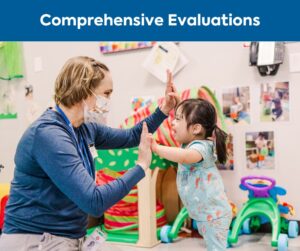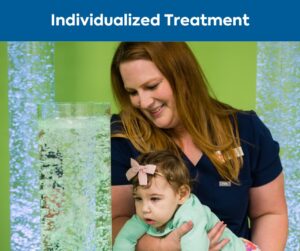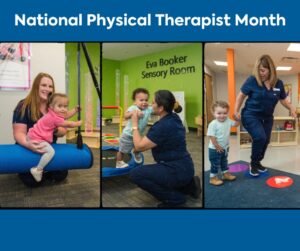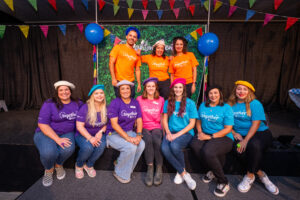Early childhood marks a period of rapid growth and development that lays the foundation for future skills and abilities. For infants and toddlers with developmental delays or disabilities, targeted intervention during these formative years is essential to foster development to their fullest potential. Pediatric Physical Therapists are invaluable in providing early intervention services at Brighton Center, to support the motor, sensory, and functional needs of young children from birth to three years of age in our Early Childhood Intervention (ECI) program.
Brighton Center and Early Childhood Development
Our Brighton Center ECI Pediatric Physical Therapists receive specialized training which involves years of education, licensure, and specialized training to work with infants and children to enhance their functional independence. They play a key role in our interdisciplinary early intervention teams that provide comprehensive early childhood development services to children from birth to 36 months. The Individuals with Disabilities Education Act (IDEA) mandates that states provide Early Intervention support through coordinated programs. In fact, Brighton Center’s Early Childhood Intervention (ECI) program is one of 45 programs the State of Texas contracts. ECI’s goal is to quickly identify delays and implement services to minimize impairments and maximize the child’s skills. Research demonstrates that early intervention is most effective during periods of heightened neuroplasticity in the first few years of life. By intervening early, Pediatric Physical Therapists help establish movement and independence as the foundation for continued development.

Comprehensive Evaluations
Pediatric Physical Therapists conduct in-depth evaluations using standardized assessments and clinical observation alongside Early Intervention Specialist (EIS) to determine eligibility criteria and treatment plans called Individual Family Service Plans (IFSP). Specifically, they evaluate in all 6 areas of development which include Cognition, Gross Motor, Fine Motor, Communication, Self-Help and Adaptive skills using state required assessment like the BDI-3 and DAYC. Furthermore, these evaluations identify functional limitations and developmental delays to guide creation of an effective treatment IFSP catered to each child enrolled in Brighton Center’s ECI program. Additionally, it provides baseline data to measure progress over the course of intervention. In short, a thorough assessment is crucial for understanding the child’s needs and strengths to build upon. If you are a parent or guardian of a child age birth to 36 months that needs to be evaluated, submit an inquiry form and we will get back to you immediately.
Individualized Treatment
Using evaluation results, Pediatric Physical Therapists and EISs design specialized treatment plans (IFSP) targeting the child’s individual developmental needs with parents/ caregivers. Pediatric Physical Therapists then provide strategies to enhance infants gross motor skills like rolling, crawling, standing, and walking. Fine motor skills needed for reach, grasp, object manipulation and hand use are assessed. Balance, strength, range of motion, tone, reflexes, and reactions are also examined to determine sensory processing and motor control. A variety of pediatric physical therapy techniques and strategies may be incorporated, including:

- Hands-on facilitation and guided movement patterns to teach new motor skills
- Strengthening exercises for posture, balance, and coordination
- Functional training for daily tasks like mobility, dressing and feeding
- Sensory integration activities to improve body awareness and regulation
- Adaptive equipment like walkers, orthotics or splints for support and alignment
- Manual therapy to maintain flexibility and range of motion
- Parent education for incorporating therapies into daily routines
By thoughtfully tailoring interventions to each child and their daily routines, Pediatric Physical Therapy can promote meaningful early childhood development and participation. Frequent reassessment allows for adjustment in plans as skills progress.
Naturalistic Environment
A key component of ECI is providing services in the child’s natural settings including their home, childcare or community. Pediatric Physical Therapists coach caregivers on how to implement therapeutic techniques during routine daily activities. Functional skills are practiced and reinforced within real-world contexts to encourage generalization of skills. The natural environment and coaching approach promote carryover and incorporates development into every family’s life.
 Family Empowerment
Family Empowerment
Families play a critical role in early intervention. Pediatric Physical Therapists provide guidance via our coaching approach, training, and resources to fully involve parents and caregivers. Caregiver education teaches appropriate developmental handling, positioning, facilitation, and home program implementation. Our Pediatric Physical Therapists empower families to understand their child’s diagnosis and developmental needs, as well as advocate for their child. Productive collaboration leads to consistency between therapeutic interventions and the child’s daily routine for optimal benefit.
Early childhood marks a critical window for establishing foundations for growth and independence. Pediatric physical therapy services in natural settings provide targeted support to infants and toddlers with special needs during this pivotal time. In Brighton Center’s ECI program, our Pediatric Physical Therapists work closely with children and families to promote functional development from the earliest age. Some children may receive evaluation only days or weeks after birth. Early intervention maximizes a child’s potential to participate and thrive throughout their lifetime.
National Physical Therapy Month
 Brighton Center recently celebrated National Physical Therapy Month in October. Congress designated October as National Physical Therapy Month in 1998 after campaigning by APTA and therapists across the country. October was selected thoughtfully by the physical therapy community for a few key reasons to promote physical therapy. October coincides with American Physical Therapy Association (APTA) annual events like the membership assembly and national conference. Establishing October as National PT Month allowed synchronization with existing APTA meetings and activities. Fall is back-to-school season and a time when sports and activities resume. It’s an opportune moment to promote injury prevention, fitness, and the role physical therapists play in keeping people active. Cooler fall weather often motivates people to become more active after summer heat. October encourages this motivation and promotes physical therapists’ value in facilitating activity and wellness.
Brighton Center recently celebrated National Physical Therapy Month in October. Congress designated October as National Physical Therapy Month in 1998 after campaigning by APTA and therapists across the country. October was selected thoughtfully by the physical therapy community for a few key reasons to promote physical therapy. October coincides with American Physical Therapy Association (APTA) annual events like the membership assembly and national conference. Establishing October as National PT Month allowed synchronization with existing APTA meetings and activities. Fall is back-to-school season and a time when sports and activities resume. It’s an opportune moment to promote injury prevention, fitness, and the role physical therapists play in keeping people active. Cooler fall weather often motivates people to become more active after summer heat. October encourages this motivation and promotes physical therapists’ value in facilitating activity and wellness.
The annual spotlight in October provides an impactful, unified way for physical therapists to educate the public on the benefits of physical therapy for health, movement, and function across the lifespan. It reinforces Physical Therapy’s integral role in population wellness and health care delivery.

As we said goodbye to October, we wanted to take a moment to celebrate the 15 Pediatric Physical Therapists we have on staff at Brighton Center and all that they do for the children and families we serve.















